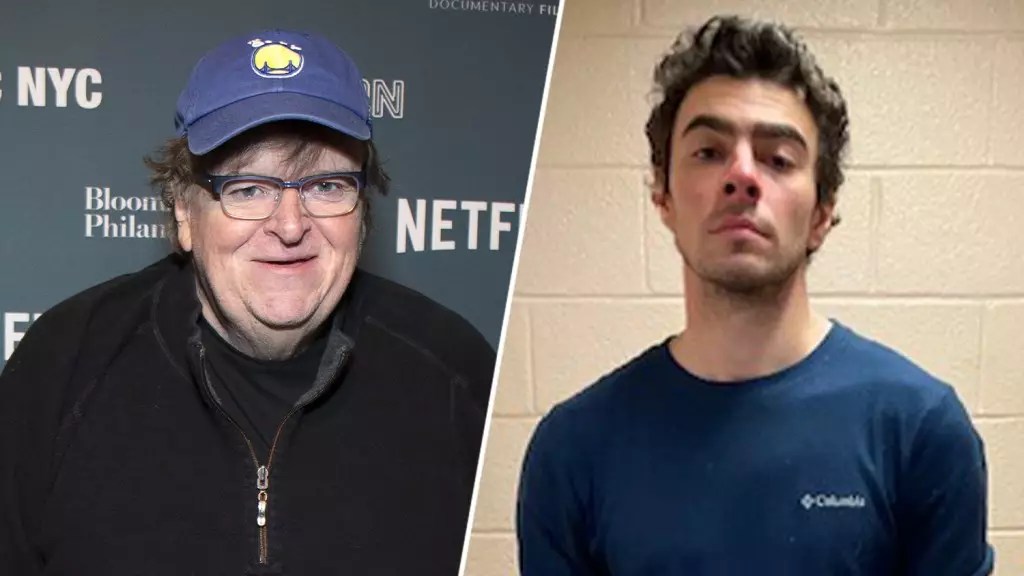In the wake of tragedy, people’s feelings often amplify, catalyzing emotions that can lead to polarized views on complex issues such as healthcare. The recent murder of UnitedHealthcare’s CEO, Brian Thompson, allegedly at the hands of Luigi Mangione, has not only shocked the nation but also reignited debates surrounding the ethics and failures of the for-profit healthcare system in America. The ensuing dialogue can easily shift from heartfelt discussions about loss to dangerous rationalizations of violence, and in this landscape, filmmaker Michael Moore has chosen to respond.
Moore’s open letter serves as both a condemnation of murder and an affirmation of the outrage that has surged toward the healthcare industry. His observations shed light on a simmering resentment that has been brewing among the public—one borne from years of frustration with an industry that has prioritized profit over patient care. He notes that the reactions to the CEO’s death are not merely knee-jerk reactions; instead, they reflect deep-seated grievances related to the pervasive suffering caused by health insurance practices in the United States.
Moore articulates that the anger expressed by individuals in the aftermath of Thompson’s murder is wholly justified. He does not shy away from the fact that the landscape of healthcare in America has produced mass suffering, with many individuals—through no fault of their own—confronting outrageous medical expenses, denied claims, and ultimately, life-threatening predicaments due to inadequate insurance coverage. The film director passionately rejects attempts to pacify this outrage, emphasizing that it is high time for such frustrations to receive prominent media attention.
Moore’s insistence that “this anger is not about the killing of a CEO” is crucial to understanding the broader implications of the discontent. It transcends individual acts of violence; this is about systemic issues that have led to real and tangible suffering for countless Americans. The healthcare industry’s practices, marked by high costs and recombinant financial burdens on patients, create an environment where tragedy becomes a common narrative. In doing so, Moore invites the public to look beyond the salient act of violence and consider the more significant injustices that have fostered such sentiments.
While Moore acknowledges the validity of the public’s anger, he firmly distances himself from any defense of Mangione’s violent actions. This juxtaposition is pivotal in the conversation about societal frustrations. Characterizing the incident as a “rich on rich crime,” he underscores that such violent acts do not represent the grassroots struggles of everyday Americans facing healthcare dilemmas. Mangione, hailing from a wealthy background, invokes questions about whether he truly embodies the frustrations of those who suffer the consequences of a broken system.
Moore asserts that “no one needs to die” as a consequence of insurance policies or the decisions of corporate executives, positioning the argument even further against the backdrop of moral and ethical responsibilities. His focus is not just an indictment of one individual or even the corporation but rather an appeal for compassion and systemic change. The reality that individuals may perish due to lack of insurance or the complexities of the healthcare system demands urgent reform.
Michael Moore calls on the public and media to address an urgent systemic issue rather than focusing on individual tragedies. The interconnected threads of healthcare policy failures and corporate accountability crystallize in moments of despair. His offering of the documentary “Sicko” as a resource reinforces the need for ongoing dialogue and understanding of these issues. The tragedy of Brian Thompson’s murder uncovers more than just a crime; it illuminates the pervasive inequities within the American healthcare system that have fueled anger, distress, and, tragically, violence.
This moment serves as a rude awakening—an opportunity to not only reflect on anger but to channel it toward meaningful reform, empathy, and a collective demand for justice in healthcare accessibility.


Leave a Reply